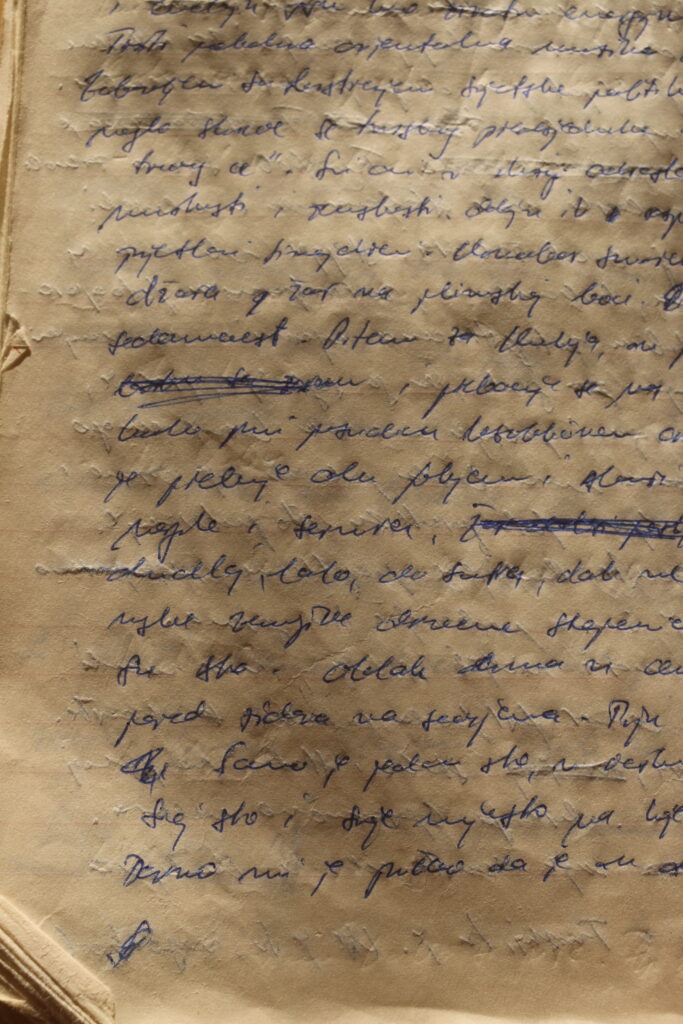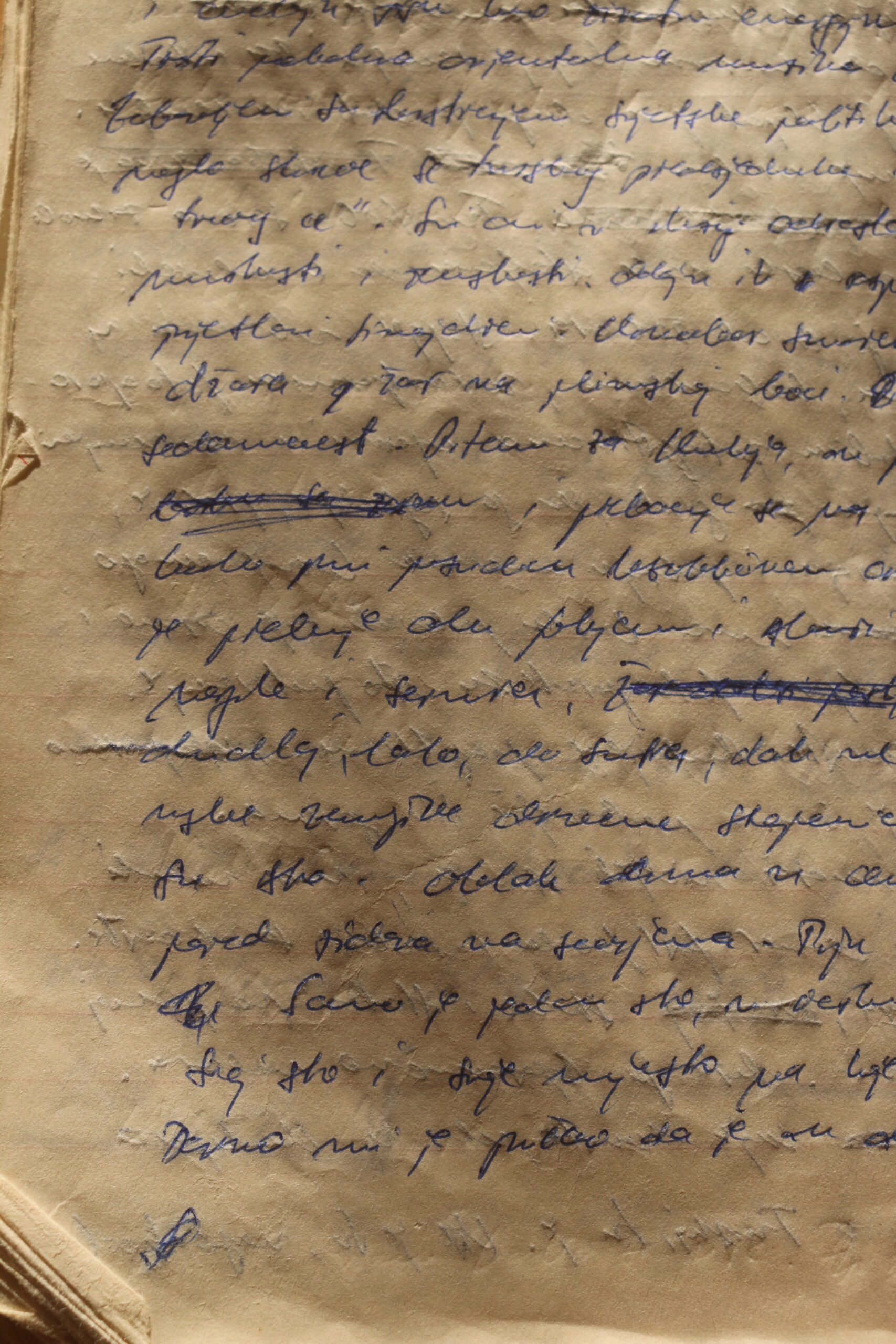
I open the door, the smell of hookah hits me. Heavy and sweet, it makes me nauseous. Reminds me of some disgusting, cheap perfume. The place is arranged like a mosque. A mosque with a bar. Two floors, and still small. On the ground floor you can hardly turn around. Upstairs it’s a little more spacious, but it’s the attic. A taller man couldn’t stand up straight. Carpets wall to wall. Floor cushions stretched along each wall. Kids and young people crammed on them. No one older than, what do I know, twenty, twenty-two at most. All dressed the same, in some kind of tracksuits or jeans with rhinestones, half-open tight shirts and shiny sweatshirts. They sit sprawled, sucking on the hookah as if they were drawing out life force from some magic lamp. Then they pass it to the next one for a pull. Peasant music blares, but nobody seems to listen. The talk jumps suddenly from the Turkish president to some girl from class. Everyone thinks they’re tough but they drink like immature roosters.
The waiter, bored, sunk behind the bar, stirs the coal on a gas tank. He can’t be older than seventeen. I ask for Kuki, he points upstairs. Then he switches to preparing a hookah. I watch him fill the clay bowl with red paste, cover it with foil and poke holes with a needle so the coal can draw. He fixes it on top of the hookah and serves it. Then comes the coal, and you suck until you throw up.
I climb the narrow wooden stairs. Upstairs it’s the same. A cloud of smoke in the middle of the room. Smokers leaning against the walls, sprawled on the cushions. Drinking Coke, coffee, Sensation. Only one table, in the corner. Small, round, tin. On it coffee and a hookah. That’s where Kuki sits. He has his table and his spot, and no one else is allowed to sit there. He once told me he brought the first hookah to the city. That sounds like the kind of tall tale Kuki would tell. He sits and smokes slowly, like a master of the craft. He inhales the smoke through the hose, holds it in, then opens his mouth and the smoke pours out. Then he makes rings of smoke. In that moment he looks like a fish just pulled out of the water. Then he laughs at it.
Kuki spots me and pulls a pillow over so I can sit.
“Sit down,” he says.
“What will you drink?” he asks.
“I don’t know. A beer.”
“There’s no beer here,” says Kuki.
“Then coffee,” I say.
Kuki whistles. I hear steps on the stairs. The honor student from downstairs appears.
“What kind of coffee?” asks Kuki.
I say espresso. None. Nescafé. None. Then Turkish.
“Bosnian,” the kid corrects me.
“Whatever, just bring it.”
The kid disappears. Kuki offers me the hookah hose. I say no. I take out a cigarette, light it. Then we sit in silence while Kuki takes a few more drags. He’s a big guy, flat forehead and strong jaw. Sitting there with a hookah on a pillow he looks like some kind of bey. That’s what Kuki thinks of himself, too. That he’s a bey.
Kuki speaks.
“Turkish is a tough language.”
“I know.”
“You study it for years.”
“I have time.”
“For starters you only need a few phrases.”
I keep quiet. He looks at me. He starts talking about how Turkey is a big and powerful country, how many people there are, how many wonders. If we were smart, says Kuki, we’d let them run our country. Nećko would say they already do, but that doesn’t matter to me. I want to learn Turkish to take their money.
Kuki falls silent again. He takes drags.
“I’m thinking,” he says, “where to start.”
I take out a notebook.
“What’s that for?” he asks.
“To write things down,” I say.
“As you wish,” he says again.
Silence. Kuki speaks.
“When you enter somewhere, you have to greet. Then you say merhaba.”
“Kuki, are you screwing with me?”
“I’m not, write it down. Merhaba is hello.”
“I know that, Kuki, for fuck’s sake.”
“Then remind yourself.”
Well, damn, I asked to learn from him. I could have signed up for a course, but I don’t have that kind of money. I write: merhaba is hello. Kuki blows smoke like a locomotive. Speaks again:
“When you meet someone, you greet again and say… what do you say?”
“Fuck you, Kuki…”
“What do you say?”
“Merhaba.”
“That’s right, merhaba, and then you ask how are you. Merhaba, naslsn.”
“What?”
“Naslsn.”
“How do you spell that?”
“How do I know how to spell it. Do you want to speak or write books?”
“I’ll write it how it sounds.”
Kuki spells it out slowly, I write it down. N, a, s, l, s, n. Then I try to pronounce it a few times. Nalsn. Nasln. Naalsn. Naaaaalsn. Kuki corrects me. Naslsn. Naslsn. Then we act like we’re meeting and I say merhaba, naslsn. Kuki keeps correcting me.
After half an hour I say:
“How do you answer that?”
“What do you mean how do you answer?”
“Well, how are you, I’m fine.”
Kuki is quiet.
“You just say alhamdulillah.”
“Alhamdulillah.”
“Exactly. That’s how they do it.”

